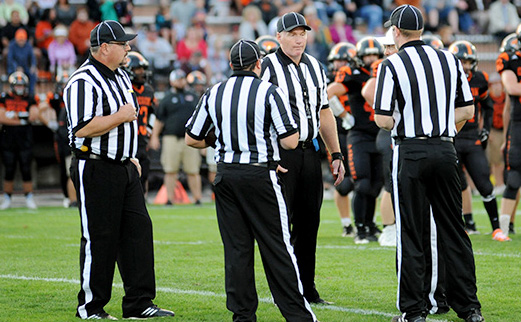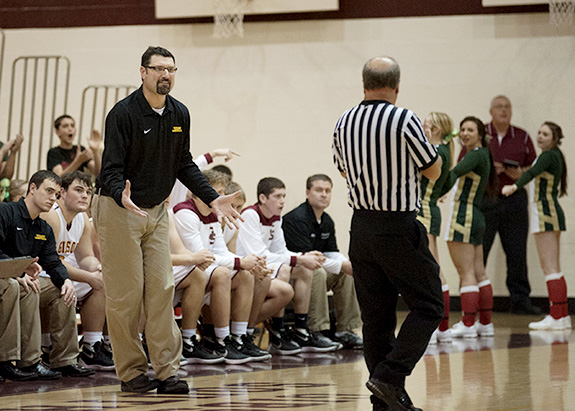Fighting for a Future
In 2017, a funding crisis nearly cost Lakewood (N.J.) High School its entire athletic program. When some sports were saved, the Piners football program was left struggling to survive.
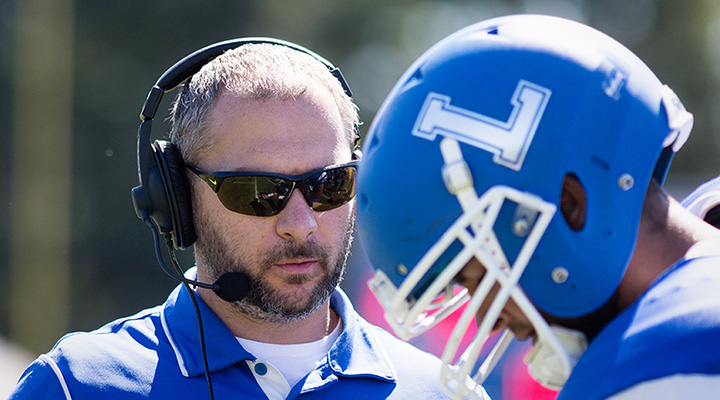
Without football, L.J. Clark easily could have been ushered down a path of drugs and gangs. The sport opened doors that were otherwise locked and boarded shut. So when Lakewood (N.J.) High School was faced with gutting its athletic department, Clark’s first concern was what it could mean to the future of the athletes.
“Football teaches these young men how to deal with adversity,” said Clark, who is in his eighth season as the sport’s head varsity coach. “It teaches them character, it teaches them cohesiveness as a family. These programs give kids an opportunity to go to school and play sports, and maybe that’s a gateway for (higher) education.”
It was near the end of April 2017 when Clark received news that the future of the entire athletic department was in jeopardy. A $14.7 million funding gap was suffocating Lakewood’s extracurriculars, and the school also faced the prospect of laying off more than 100 teachers. An $8.5 million state loan that spring saved most jobs and sports like baseball, soccer and track. Football remained in limbo.
With three months before kickoff to the new season, Clark knew he needed to do something. The year prior, his football program sent four players to college on full athletic scholarships. He thought about his current roster and the athletes who wouldn’t have the same opportunities to play at the next level. He also thought about the kids in the Lakewood community who come from broken homes, using sports as a temporary sanctuary from their daily struggles. Clark didn’t want to let them down.
I’m doing this because of what my coaches did for me.
“I told the kids, ‘Don’t read all the papers,’” Clark said. “We’re going to have a program. I promise you.”
The power of sports
Clark is living proof of what Lakewood athletics can do for a teenager with a clouded future. He graduated from the school in 1999 a three-sport athlete, and went on to play football at NCAA Division III Fairleigh Dickinson University. The sport instilled loyalty and family values. Without it, Clark believes he never would have attended college.
The same can be said for many of the kids who come through Clark’s program. In his 13 seasons with the football team, he has watched players earn Division I scholarships and one make the NFL. There also are those who graduate and never play the game again. In all of them, Clark watches as the sport helps them grow from boys to young men.
“What I brought back to Lakewood is that family atmosphere,” he said. “You never let your brother down, and whatever’s called upon you, you do it. That’s been a big part of our success.”
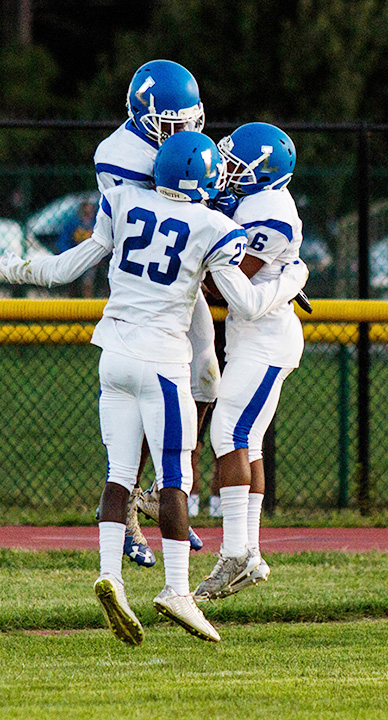 When Clark broke the news to his players about the program’s funding, he refused to cast doubt on the 2017 season. The coaching staff promised to fundraise and reach out to local businesses for support — anything to keep the program alive. Clark said the biggest hurdle was finding a way to pay for the required insurance.
When Clark broke the news to his players about the program’s funding, he refused to cast doubt on the 2017 season. The coaching staff promised to fundraise and reach out to local businesses for support — anything to keep the program alive. Clark said the biggest hurdle was finding a way to pay for the required insurance.
» ALSO SEE: Fixing your football team
Defensive coordinator Lewis Peccarelli remembers meeting with the players and pledging to help the program survive. For him, the mission was personal because he fully understood the power football had on the two dozen players in the program. He played high school football 34 miles south of Lakewood at Southern Regional, and it was his own coach who inspired him to follow a path to becoming a teacher and coach.
“I’m doing this because of what my coaches did for me,” Peccarelli said. “These kids go home to poverty, to broken homes, to trauma, and they come from trauma. We have a lot of kids from other countries who have been in traumatic situations, and their families brought them here to get away from that.
“My job is to not only give them something enjoyable and positive to do, but teach them those life lessons and to be accountable to school, work ethic and practice. I wouldn’t be able to do that if I wasn’t a coach.”
Saving Lakewood football
Coaches figured the program needed more than $70,000 to salvage the 2017 season. The state loan that saved some jobs, after-school activities and a handful of other sports wasn’t going to help, so the team needed to turn someplace else.
Peccarelli said coaches were prepared to forfeit their stipends. Athletes and students staged a walkout near the end of the 2016-17 school year, protesting the across-the-board cuts to extracurriculars and staff. Clark received calls from colleagues at nearby schools to assist with equipment, and they even offered to pay all referee fees for the 2017 season. The gestures helped but barely moved the needle toward the program’s fundraising goal.
It wasn’t long before the Lakewood Township committee caught wind of the school district’s struggle. The township was the fastest growing in New Jersey, and the population boon placed it in a unique position to provide financial assistance.
Mayor Raymond Coles didn’t play sports in high school, but his son’s participation in cross country gave him an appreciation for the discipline and responsibility they impart on students. When Coles and township committee members heard that several high school programs were on the brink of elimination, they stepped in. The township awarded a $1.2 million grant to the school district, $84,000 of which was earmarked for the football program.
“Athletics has always been ingrained in the Lakewood spirit,” Coles said. “The thought of losing not just football but the other activities was too much for the committee. I couldn’t think of a better reason to use it than to make sure the kids have athletics and after-school activities.”
Back to business
With funding issues behind them, players and coaches could get back to football. Clark said despite the uncertainty surrounding the fall season, the team kept its summer regimen intact. Players still filled the weight room, and coaches prepped as if the program’s future was never in doubt.
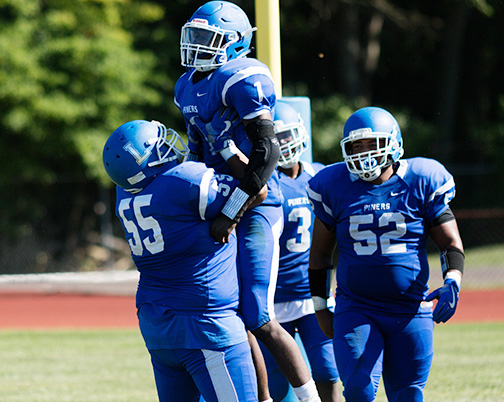 Lakewood had its share of challenges on the field. The greatest among them was that the team had only 23 healthy players, and Clark admitted that the offseason turmoil discouraged the boys. The commitment from players and coaches remained the heartbeat of the program. Student-athletes could have transferred to another school, and coaches were approached with opportunities to join staffs in other programs. All chose to stay at Lakewood.
Lakewood had its share of challenges on the field. The greatest among them was that the team had only 23 healthy players, and Clark admitted that the offseason turmoil discouraged the boys. The commitment from players and coaches remained the heartbeat of the program. Student-athletes could have transferred to another school, and coaches were approached with opportunities to join staffs in other programs. All chose to stay at Lakewood.
The season got off to an ugly start. The Piners dropped four of their first five games, a stretch that Peccarelli expected to be the “weak” part of their schedule. The team’s All-State quarterback dislocated his elbow, and Clark had to move his running back under center. During the second game, three players broke their collarbones.
“We stumbled out of the block,” Clark said. “I don’t believe in excuses. We still should have got it done, but we played kids that normally wouldn’t be varsity starters and they didn’t know how to execute the way we needed to execute.
» ALSO SEE: Building a successful football program from the ground up
“I know people might not believe me, but when we were 1-4 every kid came and practiced like they were 5-0. My message was the same the whole way through: You quit now, you’ll quit the rest of your life.”
The Piners faced the heart of their schedule as a longshot to make the postseason, and that’s when the tide turned. The team’s quarterback returned at less than full strength, and Clark said his leadership energized the players. Once the signal caller was completely healthy, the Piners hit their stride, rolling off four straight wins including a playoff victory over Lacey Township. That set up a semifinal game with Woodrow Wilson, where Lakewood’s championship aspirations came to an end in a 46-26 loss.
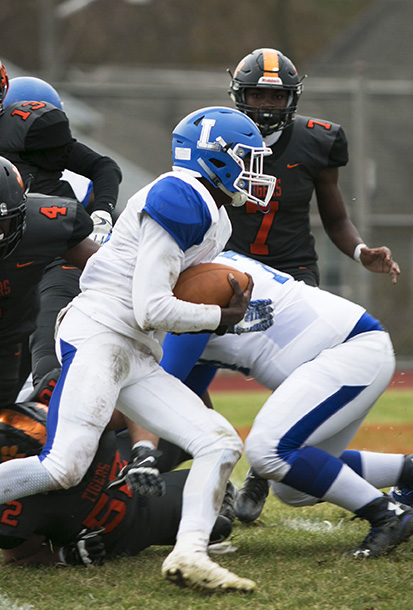 The season didn’t conclude the way Clark wanted, but the program has come a long way. When he took over as head coach, the team had suffered through 33 straight losses spanning more than three years. Now that the Piners had made the playoffs for a seventh straight season, Clark felt that the program had become a great source of pride for those wearing the blue and white.
The season didn’t conclude the way Clark wanted, but the program has come a long way. When he took over as head coach, the team had suffered through 33 straight losses spanning more than three years. Now that the Piners had made the playoffs for a seventh straight season, Clark felt that the program had become a great source of pride for those wearing the blue and white.
“This group had the most wins in school history in a four-year span,” Clark said. “(The season-ending) loss was rough, because the best part of my days is being around those kids. I’m grateful to be in charge of them, let alone coach them.”
The fight continues
In September, the Lakewood Township voted for a second year to allocate $1.2 million to high school activities. Coles is hopeful that newly elected Gov. Phil Murphy will repair New Jersey’s broken school funding formula, but until then financial assistance for Lakewood High School could be revisited on an annual basis.
Clark doesn’t know what the future holds, but he fully understands the impact his program has made. He recalls one player who grew up in one of the poorest neighborhoods in Lakewood but earned an athletic scholarship and is now a teacher in Harlem, New York. Another player, Chapelle Russell, lived in a Red Carpet Inn (and later with Clark’s parents) while his mother was deployed in the Navy. She paid $40 per day to taxi Russell to school because he wanted to stay in the Lakewood area. He now plays linebacker at Temple University.
Clark and Peccarelli could go on with stories like these, and their experiences are not uncommon for high school coaches. It’s why they’re willing to fight for the program and the privilege to play football on Friday nights. Without school-sponsored sports, both are concerned for what the future might hold.
“A lot of these kids don’t have hope,” Peccarelli said. “They think they’re going to be doing construction the rest of their lives, or they’re going to be selling drugs or cleaning houses. That’s what goes on in our community.”
“I think all these school thinking about cancelling sports are crazy,” Clark added. “You’re going to get a lot of angry, disgruntled kids who aren’t going to have a way out. We’re teaching these young men characteristics and traits that they’re going to hold for the rest of their lives. Without sports, how are they going to get that?”

